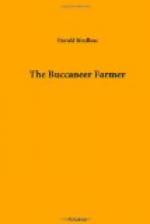“You can try,” Askew replied, and jumping down stood in the water, holding out his hand. “Come on; there’s not much risk of a slip.”
Since it was too late to refuse, Grace took his hand and he waded across, steadying her, while the current rippled round his legs. Some of the stones were covered, but with his support she sprang across the gaps and the effort did not hurt her foot as much as she had thought. He was not awkward. She liked his firm grasp, and his care that she did not fall; particularly since she saw he was satisfied to give her the help she needed and knew when to stop. After she got across she thanked him and let him go.
When she crossed the field Askew went home in a thoughtful mood, though he was conscious of a pleasant thrill. He had felt the girl’s charm strongly as he stood near her at the stile, and now tried to recapture the scene; the dark alder branches moving overhead, the sparkle of the water, and the light and shadow that touched his companion. Her face was attractive; although he was not a judge of female beauty, he knew its molding was good. Mouth, nose, and chin were finely but firmly lined; her color was delicate pink and white, and she had rather grave blue eyes. Her figure was marked by a touch of patrician grace. Askew smiled as he admitted that patrician was a word he disliked, but he could not think of another that quite expressed what he meant. Anyhow the girl’s charm was strong; she was plucky and frank, perhaps because she knew her value and need not to pretend to dignity. In a sense, this was patrician, too.
All the same, Askew, though young and romantic, was not a fool. He had had a good education and had then spent two years at an agricultural college; but he was a farmer’s son and he knew where he stood, from the Osborns’ point of view. He had been of help, but this was no reason Miss Osborn should recognize him when they next met; yet he somehow thought she would. In the meantime, it was rash to think about her much, although his thoughts returned to the stile beneath the alders where he had watched the sun and shadow play about her face.
CHAPTER III
A COUNCIL OF DEFENCE
The sun had sunk behind the moors when Peter Askew sat by an open window in his big, slate-flagged kitchen at Ashness. All was quiet outside, except for the hoarse turmoil of the force and a distant bleating of sheep. In front, across a stony pasture, the fellside ran up abruptly; its summit, edged with purple heath, cut against a belt of yellow sky. The long, green slope was broken by rocky scars and dotted by small Herdwick sheep that looked like scattered stones until they moved.
The kitchen was shadowy, because the house was old and built with low, mullioned windows to keep out snow and storm, and a clump of stunted ash trees grew outside the courtyard wall. A fire of roots and peat, however, burned in the deep hearth, and now and then a flickering glow touched old copper and dark oak with red reflections. Collectors had sometimes offered to buy the tall clock and ponderous meal chest, but Askew would not sell. The most part of his furniture had been brought to Ashness by his great-grandfather.




